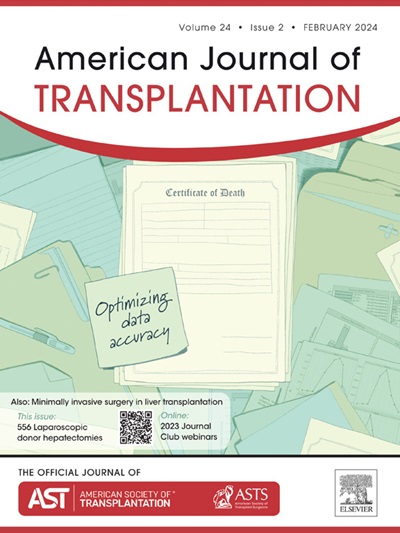移植时偶然发现的肺癌的预后影响:移植受者科学登记处和国家癌症数据库的联合研究。
IF 8.2
2区 医学
Q1 SURGERY
引用次数: 0
摘要
人们对肺移植受者肺部恶性肿瘤的影响知之甚少。在这里,我们将国家移植数据库和癌症数据库联系起来,以确定肺癌如何影响肺移植受者的预后。我们将移植受者科学登记处和国家癌症数据库的记录进行了链接,以确定 186 名接受了肺移植并随后被诊断出患有肺癌的患者。这些患者被确定为 IELC 患者,并与接受肺移植但未被诊断出 IELC 的对照组患者进行了比较。在这186名患者中,144人患有非小细胞肺癌(NSCLC),6人患有小细胞肺癌,36人患有神经内分泌癌。与对照组相比,I/II期非小细胞肺癌或任何一期神经内分泌癌患者的总生存期和癌症相关死亡率相当。相反,III/IV 期 NSCLC 患者的总生存率较低,癌症相关死亡率较高,而且很少接受癌症特异性非手术治疗。综上所述,I/II期NSCLC和神经内分泌癌症应被重新视为移植的绝对禁忌症。相反,III/IV期NSCLC患者的预后较差,因此需要采取策略增加辅助治疗的使用。本文章由计算机程序翻译,如有差异,请以英文原文为准。
Prognostic implications of lung cancers incidentally identified on explant: A joint study of the Scientific Registry of Transplant Recipients and the National Cancer Database
The implications of a lung malignancy in a lung transplant recipient are poorly understood. Here, we linked national transplant and cancer databases to determine how lung cancer impacted prognosis in lung transplant recipients with incidentally explanted lung cancers (IELCs). Records from the Scientific Registry of Transplant Recipients and National Cancer Database were linked to identify 186 patients who received a lung transplant and were subsequently diagnosed with lung cancer. These patients were determined to have IELC and were compared with control patients who received a lung transplant but were not diagnosed with IELC. Of the 186 patients, 144 had non-small cell lung cancer (NSCLC), 6 had small cell lung cancer, and 36 had neuroendocrine cancer. Patients with stage I/II NSCLC or any stage neuroendocrine cancer had overall survival and cancer-related mortality rates comparable with those of controls. Conversely, patients with stage III/IV NSCLC had worse overall survival, higher rates of cancer-related mortality, and infrequently received cancer-specific nonoperative treatment. Taken together, stage I/II NSCLC and neuroendocrine cancers should be reconsidered as an absolute contraindication to transplant. Conversely, patients with stage III/IV NSCLC had worse outcomes, and strategies are needed to increase the use of adjuvant therapy.
求助全文
通过发布文献求助,成功后即可免费获取论文全文。
去求助
来源期刊
CiteScore
18.70
自引率
4.50%
发文量
346
审稿时长
26 days
期刊介绍:
The American Journal of Transplantation is a leading journal in the field of transplantation. It serves as a forum for debate and reassessment, an agent of change, and a major platform for promoting understanding, improving results, and advancing science. Published monthly, it provides an essential resource for researchers and clinicians worldwide.
The journal publishes original articles, case reports, invited reviews, letters to the editor, critical reviews, news features, consensus documents, and guidelines over 12 issues a year. It covers all major subject areas in transplantation, including thoracic (heart, lung), abdominal (kidney, liver, pancreas, islets), tissue and stem cell transplantation, organ and tissue donation and preservation, tissue injury, repair, inflammation, and aging, histocompatibility, drugs and pharmacology, graft survival, and prevention of graft dysfunction and failure. It also explores ethical and social issues in the field.

 求助内容:
求助内容: 应助结果提醒方式:
应助结果提醒方式:


